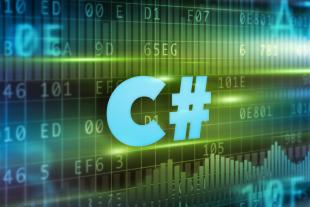Six Reasons Why You Should Learn C#


C#—it's not just a musical note. First introduced in 2000 alongside Microsoft's .Net framework, it’s been through five versions and one (now-retired) mascot named Andy. Now, it’s arguably one of the most valuable programming languages to learn—and here’s why.
Why Learn C#?
C# popularity is higher than ever. C# was named the programming language of 2012 by the PopularitY of Programming Language (PYPL) index. According to PYPL, C#’s popularity grew by 2.3% in 2012—more than any other programming language. Although it’s still not as popular as Java or PHP, it’s neck and neck with C++; each has a 10.5 percent developer share.
Is C# worth learning?
C# could get you a job. The growth of C# was spurred by the release of Windows 8. C# is currently the most used language in the development of third-party apps for Windows. It also is a very popular language on mobile devices, including the Windows Phone.
C# is also the most-used language in programming for Windows Silverlight, which in 2011 became more popular than Adobe Flash.
Because of all these factors, companies are looking for C# savvy programmers. And the pay isn’t bad, either; according to SimplyHired.com, even entry level C# developers make an average of $53,000 a year. This is fairly comparable to the wages from other, similar languages.
Is C# easy to learn?
C# is simple (as programming languages go). If you know C, C++, or Java, learning C sharp should be a snap. Sure, any programming language requires time to learn and master, but the C# learning curve was made to be short for those already versed in programming languages. C# is syntactically very similar to Java, for example. Let’s look at Java vs. C3 with the classic "Hello World" program. Here's what it looks like in Java:
public class Hello {
public static void main (String args[]) {
System.out.println ("Hello World");
}
}
And in C#, it looks like,
public class Hello
{
static void Main()
{
System.Console.WriteLine("Hello World");
}
}
Sure, some of the words are different, but the structure is fundamentally the same. The difference between Java and C# are less the differences between two different languages and more like the differences between two dialects of English. An American ordering chips might get french fries in England, but they still understand the basic structure of the language being spoken.
The less programming-savvy among us might be surprised to hear any programming language described as "simple." But even if a "Public Class" simply sounds like a nice event to attend on a Saturday, C# might be a good place for you to start learning programming languages. The fact that it's easy for people who know C, C++, and Java to learn C sharp also works the other way around—it's easy for people who know C# to learn these languages as well.
Should I learn C#?
C# is very useful. C# is very similar to other object-oriented programming languages, but it has a unique set of features that make some programmers favor it. A few of these include:
-
Built-in functional programming capabilities
-
Built-in asynchronous programming capabilities
-
Native garbage collection
-
Type safety
If this set of features sound ideal for your programming style, perhaps it is worth learning C# programming.
There are tons of great C# resources, including instructional websites, videos, books, and manuals. In the free department, there is a list of eight free e-books available on Readwrite.com, although some of them are dated.
Of course, one of the problems with free resources is that they often aren’t of as high quality as paid ones. If you’re a professional who wants to learn C# in a short time, the best place to learn C# depends on your preferred learning mode. If you already know a lot about programming, a book like C# for Programmers or C# in Depth might be ideal. If you’re looking for learning c sharp programming for beginners, take a peek at something like C# 5.0 in a Nutshell. And if online courses are more your speed, over at OpenSesame we have many C# tutorials available.
In closing, why not? There's no good reason not to learn C#, particularly if you already know programming languages like C, C++, or Java. Your investment is simply the cost and time of a course or book. The return on this investment is the knowledge of a highly useful, highly marketable programming language. This could play a crucial role in anything from getting you a job to helping you to develop an application for the Windows Phone to simply adding another skill to your resume.



